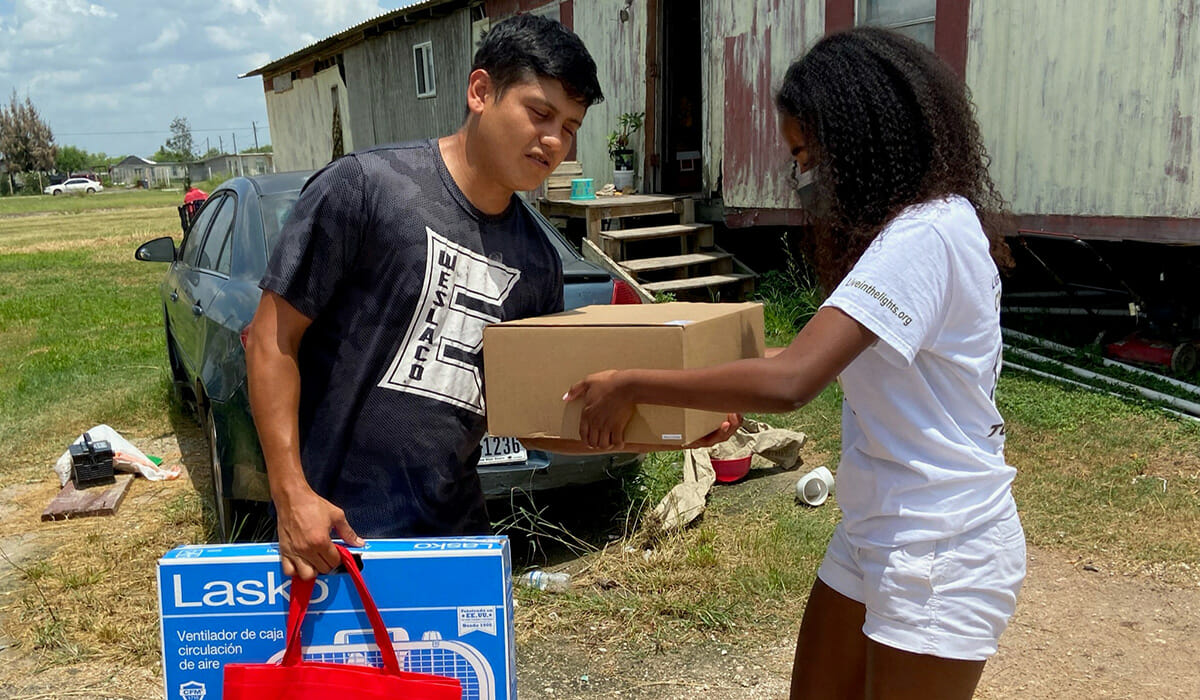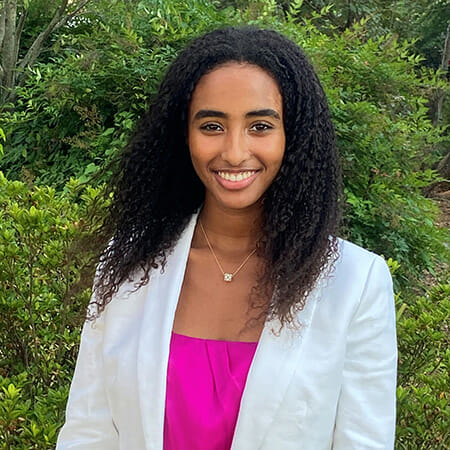Teen Lights Up Texas Community Through Solar Panel Donations

Meet Daily Point of Light Award honoree Adie Selassie. Read her story and nominate an outstanding volunteer or family as a Point of Light.
When Adie Selassie was in eighth grade, she was presented with a unique opportunity from her school to choose from different destinations to travel to over spring break. The Arlington, Va. native was drawn to a trip to the Texas-Mexico border to learn about the colonias, a group of housing settlements, so she could spend part of her break giving back. Adie was shocked by the living conditions she saw during the trip, which included a lack of electricity due to many homes being off the electrical grid, as well as to residents who were on the grid not being able to afford electricity bills or struggling due to flooding and power outages in the area.
Upon her return home, Adie knew she wanted to do something to help the people of the colonias. In 2018, she founded Live in the Lights, a nonprofit that provides solar panels to residents. Now 17, Adie has led her organization in donating over 50 solar-powered energy units, as well as fundraising donations and over 1,000 clothing items for the colonias. Live in the Lights works entirely through donations and will be hosting a virtual 5K run/walk fundraising in September, with more information to come on their website.
Describe your volunteer role with Live in the Lights.
I’m the founder and president of Live in the Lights. It was founded back in 2018. My school has a series of trips you can take for spring break during eighth grade and I chose to go down to an impoverished community in Texas called the colonias. They’re lacking basic services like electricity, running water and sturdy housing, and I was baffled by the living conditions there. I hadn’t seen that type of poverty in America before. When I came back to Arlington where I live, I couldn’t not do anything about it. I saw how little opportunity structurally the people living there had to change their living circumstances. I was inspired to do something and that’s when I researched to learn exactly what I could do to help and what the specific challenges the residents of the colonias are facing. A big challenge I noticed is electricity and access to power. I know that affects so many parts of your life including how kids are able to study and learn, safety in your household and charging medical equipment, so I really saw that as something I could take on and that would be really necessary to their lives. Live in the Lights brings solar power to this community in Texas — solar power because they’re in Texas so we can use the sun, which can be tapped into 365 days a year as a free and sustainable resource to provide electricity to this community.
How do you go about donating these solar panels?
We hold different fundraising events and general emails with why they should donate and what exactly a donation can accomplish. With those donations, we purchase the portable solar panels and we ship them to Texas. We actually have a partner organization there called Proyecto Azteca. They focus more on sturdy infrastructure but they’re one of the few organizations at the border helping the colonias, so we partnered with them. Since they actually know the families pretty well, they’re able to assess which of the families need the solar panels most and create a waiting list. We discuss that list with them and then we go about distributing the solar panels we purchased.

Can you describe your Double Sustainability Mandate with Proyecto Azteca?
Part of Live in the Lights is all about sustainability, so one of those is related to the solar panels and how that’s a sustainable solution. The other is using the extra funds these families would have because they’re no longer spending money on energy to now grow the intracolonial ecosystem of small businesses. That promotes intracolonia growth and that overall helps the economy and the colonias and the families living there. That’s a byproduct of the solar panels we’re installing.
What’s been the most rewarding part of your work?
I would say actually going to meet the families, going inside their homes and giving the solar panel to them would be the most rewarding part of my work. During the pandemic, everything has had to be remote, and so I know that the families are receiving their solar panels but it’s hard to actually see the impact that our organization is making. So to actually meet the families and be able to give that to them and to hear their testimonies after they’ve been using it for a few weeks, that was really special and motivated me to continue with my project.
What kind of feedback have you received from the families you donate solar power to?
Some of the things they were saying is it’s been really helpful for charging their medical devices. Thirty percent of southern Texas suffers from diabetes and a bunch of the residents of the colonias have CPAP machines. I received a bunch of messages saying the solar power and the energy and the electricity they got from that enabled them to charge their medical devices, which is something huge — something I hadn’t anticipated as being something solar power could help with, but something I’m really glad we were able to accomplish.
Why do you think it’s important for others to give back?
I think giving back teaches you a lot and it teaches you gratitude. You also learn a lot from the people you’re helping. You’re exposed to different communities. You can build relationships with the people you are helping. I think it’s really important to see people different from you and also see how similar they are to you. I think it brings our world together when we help each other out.
What have you learned through your experiences as a volunteer?
The colonias is a community a lot of people hadn’t heard of. Whenever I tell people about my organization, nobody knows what they colonias are. Even their mere existence is something I didn’t know about. It’s really been a privilege to be able to educate people about the community because I think it’s a forgotten community in America and one that needs to be paid attention to a little bit more.
What do you want people to learn from your story?
I would say this especially to teens or younger adults — oftentimes it seems really impossible to make an impact, no matter how great or small on a community. I would say it’s actually fairly simple if you have the drive and dedication and a good group of people surrounding you. I was 14 when I started Live in the Lights. It seemed pretty difficult and impossible to be able to install solar power to homes, but I was able to do it. So I would tell teens and other young adults to stick with it and it is possible to make a difference, even if it’s small.
Do you want to make a difference in your community like Adie? Find local volunteer opportunities.
